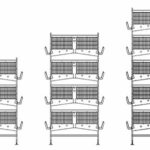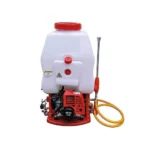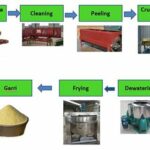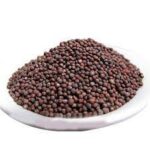Table of contents
Training on Best Management Practices for Successful Crop Production
On the 27th of April 2023, Afrimash organised a training on the best management practices for successful crop production in the smart farmers community . The training was anchored by Fiyinfoluwa Adelusi, the Sales Operations Specialist at Afrimash. The facilitator for the training was Sidney Okeke, a crop scientist and crop category manager at Afrimash. Sidney began his presentation by stating that the goal of farming is to make money, and if done well, it can be a profitable business. He emphasised that gone are the days when farming was seen as an occupation for old people in the village, and it is now essential to view farming as a real business. In this article, we will cover the steps discussed during the training that are necessary for successful crop production.
Soil Preparation
According to Sidney, the first important step in successful crop production is soil preparation. This involves testing the soil to determine its pH level and nutrient content, and then adding the necessary amendments to make it suitable for planting. Soil testing helps to determine the nutrient levels, pH, and organic matter content of the soil, which can guide farmers on the type and amount of fertiliser to use. Farmers should also prepare their land in accordance with what they want to plant. This ensures that the soil is well-prepared for planting, which is crucial for successful crop production.
Crop and Seed Selection
The second step is proper crop and seed selection. Selecting high-quality seeds that are well adapted to the local growing conditions and have a proven track record of producing high yields is essential for successful crop production. Farmers should also choose the right crop, considering market demand and profitability. A particular variety that works well in one region may not be suitable for another region. Therefore, farmers should be conversant with the varieties that work best in their location.
Proper Planting and Planting at the Right Time
The third step is proper planting and planting at the right time. Proper planting techniques, such as seed spacing, planting depth, and timing, are crucial in successful crop production. Farmers should ensure that the soil is well-prepared and free from weeds before planting. The timing of planting is also crucial to the success of a crop. The planting period may vary depending on the location, and farmers should be aware of the best planting time in their area.
Market for the Products
According to Sidney, the most important aspect of farming is the availability of a market for the products. When there is a market for the products, the farmers are in business, and it is difficult to be in the crop production business without having a ready market. Therefore, farmers should consider the market demand before deciding on what to plant.
Conclusion
In conclusion, farming is a business that requires careful planning and implementation of best management practices. The steps mentioned above are necessary for successful crop production. The training provided a platform for participants to ask questions and get clarification on some of the steps discussed. The training was informative and practical and reminded participants of the importance of viewing farming as a real business.
If you need more in-depth information on how to be a successful crop farmer, checkout this post.
Questions and Answers
Q [Muhammad]: What is the best way to store beans and prevent damage?
A [Sidney]: Bean storage is usually hampered by the beetles that bore holes into the bean and feed. For commercial production, most people use phostoxin tablets that are enclosed in either a piece of paper or cloth and are put within the grains. This fumigates the beans from within. However, the use of hermetic containers is also very effective.
Q [Muhammad]: What period is best to start rice planting?
A [Sidney]: Honestly, this would depend on the location. Some people plant in April while some plant in May. I have heard of people that started planting from March too, location and the variety may be a determinant factor.
Q [Oke]: What’s the best fertiliser to use for maize and at what week should it be applied?
A [Sidney]: NPK 15:15:15 depending on the brand. 20:15:10 can also serve depending on several agro climatic factors. In addition to what @Bello Mahmoud said, you may need to top dress your maize with urea about 4 weeks after the first fertiliser application.
Q [Muhammadu]: Do we have where to go for soil test all over the country?
A [Sidney]: Yes, the Agronomy department of the University of Ibadan carries out soil testing, but it usually comes at a high cost. Also, there used to be a soil testing laboratory in Jos Plateau State, but I am not sure if it’s still functional.
Q [Janet]: Do we need to test the soil again when we notice deficiencies in the plant, or do we need a plant scientist all through the planting session to always check and provide solutions? And won’t that be too expensive?
A [Sidney]: Soil testing is crucial to avoid trial and error, and it’s advisable to carry it out before planting. However, testing again when deficiencies are noticed in the plants can be useful in identifying the specific nutrients lacking in the soil. It may not be necessary to have a plant scientist check on the plants throughout the planting season, as farmers can learn how to identify plant deficiencies and solutions through training and experience.
Q [Bello]: What’s the best IPM techniques to be applied in vegetable crop production?
A [Sidney]: Integrated Pest Management (IPM) techniques involve using multiple pest control methods to prevent and manage pests, including biological, cultural, and chemical methods. Some examples of IPM techniques in vegetable crop production include crop rotation, use of resistant varieties, intercropping, and use of natural predators and parasites to control pests.
Q [Janet]: On pawpaw farming sir, is it advisable to go for commercial production of pawpaw (mainly foreign breed) in hot places like Yola?
A [Sidney]: Yes, it’s advisable to go for commercial production of pawpaw in hot places like Yola, especially when using hybrid seeds like Maradona F1. Greenhouse technology can also be used for raising hybrids for commercial purposes in hot places.

FREE CONSULTATION
Are you looking to start or scale your agribusiness in Nigeria? Afrimash, the #1 digital marketplace for farmers in Nigeria, offers free consultations to help you get started.
Our team of experienced agricultural consultants, like Sidney And Fiyinfoluwa can provide valuable insights and guidance on various aspects of your agribusiness.
Take advantage of this opportunity to get expert advice on how to succeed in the Nigerian agricultural industry.













